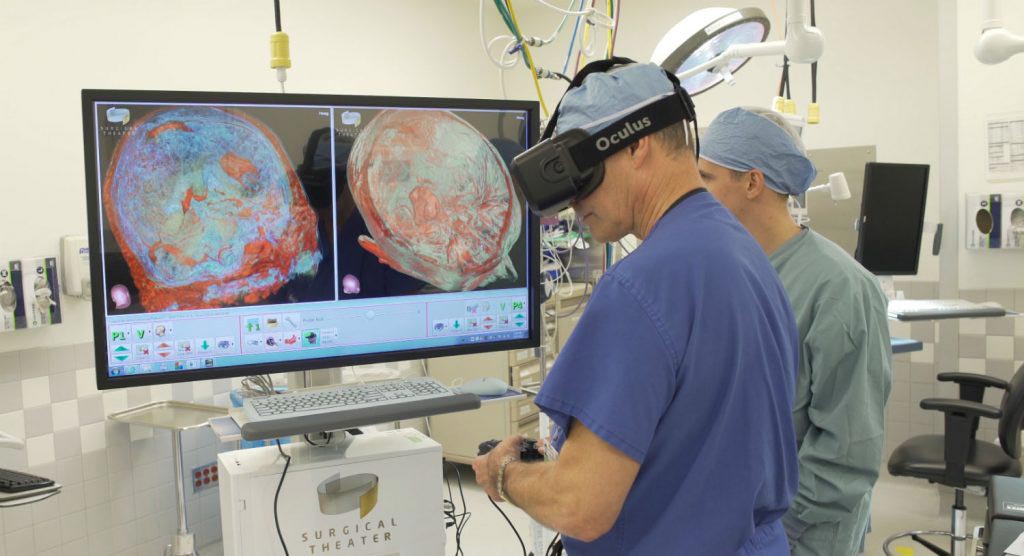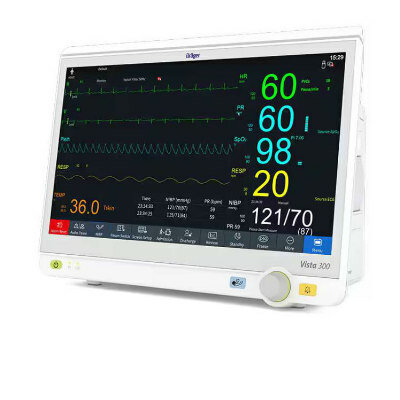Virtual Reality Platform Helps Create Surgical Plans
|
By HospiMedica International staff writers Posted on 23 Apr 2019 |

Image: A VR system assists neurosurgeons plan surgery (Photo courtesy of Surgical Theater).
An innovative 360-degree virtual reality (VR) technology allows surgeons to walk inside their patients' anatomy and create a surgical plan.
The Surgical Theater (Mayfield Village, OH, USA) Precision VR medical visualization platform is designed to work on multiple levels of interaction with the aid of the Oculus Rift or HTC Vive VR headsets. The VR models are constructed and rendered based upon CT and MRI scans, culminating in a patient-specific 360° virtual tour which can be used to create an intuitive, immersive approach to patient engagement, surgical planning, resident in training education, and multidisciplinary collaboration.
Neurosurgeons can navigate their patients’ anatomy and simulate complex operations before making an incision and residents can hone their surgical techniques and situational awareness of the patient’s brain anatomy, optimizing performance and skill before entering the operating room. Other applications include spine, ENT, thoracic, cardiac, and gastrointestinal applications. An Enterprise solution enables hospitals to achieve deployment on a system-wide scale, including satellite locations, while complying with security policies, with all 360° VR cases stored in the hospital's data center.
“Our Precision VR Enterprise Solution is providing 360-degree images that allow patients and surgeons to walk inside the CT and MRI, which has been proven to provide better communication of medical information between surgeons and patients and surgeons and their peers,” said Moty Avisar, CEO and co-founder of Surgical Theater. “This ‘walk-in’ experience is now available on a system-wide-scale, enhancing efficiency in the consultation and surgical planning workflow for multiple specialties.”
“The scalability of the Enterprise Solution integrates seamlessly into a hospital's existing workflow, enabling VR to be accessible anywhere, anytime,” said Chris Gough, general manager of Health & Life Sciences at Intel Corporation. “Intel and Surgical Theater have a strong partnership for bringing virtual and augmented reality solutions to healthcare, and we are delighted that the Enterprise Solution is now available for the European market.”
VR technology provides an immersive, multisensory, and 3D environment that enables users to have modified experiences of reality by stimulating the visual, auditory, and proprioception senses. VR has already been used to help treat anxiety disorders, support physical rehabilitation, and distract patients during wound care.
Related Links:
Surgical Theater
The Surgical Theater (Mayfield Village, OH, USA) Precision VR medical visualization platform is designed to work on multiple levels of interaction with the aid of the Oculus Rift or HTC Vive VR headsets. The VR models are constructed and rendered based upon CT and MRI scans, culminating in a patient-specific 360° virtual tour which can be used to create an intuitive, immersive approach to patient engagement, surgical planning, resident in training education, and multidisciplinary collaboration.
Neurosurgeons can navigate their patients’ anatomy and simulate complex operations before making an incision and residents can hone their surgical techniques and situational awareness of the patient’s brain anatomy, optimizing performance and skill before entering the operating room. Other applications include spine, ENT, thoracic, cardiac, and gastrointestinal applications. An Enterprise solution enables hospitals to achieve deployment on a system-wide scale, including satellite locations, while complying with security policies, with all 360° VR cases stored in the hospital's data center.
“Our Precision VR Enterprise Solution is providing 360-degree images that allow patients and surgeons to walk inside the CT and MRI, which has been proven to provide better communication of medical information between surgeons and patients and surgeons and their peers,” said Moty Avisar, CEO and co-founder of Surgical Theater. “This ‘walk-in’ experience is now available on a system-wide-scale, enhancing efficiency in the consultation and surgical planning workflow for multiple specialties.”
“The scalability of the Enterprise Solution integrates seamlessly into a hospital's existing workflow, enabling VR to be accessible anywhere, anytime,” said Chris Gough, general manager of Health & Life Sciences at Intel Corporation. “Intel and Surgical Theater have a strong partnership for bringing virtual and augmented reality solutions to healthcare, and we are delighted that the Enterprise Solution is now available for the European market.”
VR technology provides an immersive, multisensory, and 3D environment that enables users to have modified experiences of reality by stimulating the visual, auditory, and proprioception senses. VR has already been used to help treat anxiety disorders, support physical rehabilitation, and distract patients during wound care.
Related Links:
Surgical Theater
Latest Health IT News
- Printable Molecule-Selective Nanoparticles Enable Mass Production of Wearable Biosensors
- Smartwatches Could Detect Congestive Heart Failure
- Versatile Smart Patch Combines Health Monitoring and Drug Delivery
- Machine Learning Model Improves Mortality Risk Prediction for Cardiac Surgery Patients
- Strategic Collaboration to Develop and Integrate Generative AI into Healthcare
- AI-Enabled Operating Rooms Solution Helps Hospitals Maximize Utilization and Unlock Capacity
- AI Predicts Pancreatic Cancer Three Years before Diagnosis from Patients’ Medical Records
- First Fully Autonomous Generative AI Personalized Medical Authorizations System Reduces Care Delay
- Electronic Health Records May Be Key to Improving Patient Care, Study Finds
- AI Trained for Specific Vocal Biomarkers Could Accurately Predict Coronary Artery Disease
Channels
Critical Care
view channel
Ingestible Smart Capsule for Chemical Sensing in the Gut Moves Closer to Market
Intestinal gases are associated with several health conditions, including colon cancer, irritable bowel syndrome, and inflammatory bowel disease, and they have the potential to serve as crucial biomarkers... Read moreNovel Cannula Delivery System Enables Targeted Delivery of Imaging Agents and Drugs
Multiphoton microscopy has become an invaluable tool in neuroscience, allowing researchers to observe brain activity in real time with high-resolution imaging. A crucial aspect of many multiphoton microscopy... Read more
Novel Intrabronchial Method Delivers Cell Therapies in Critically Ill Patients on External Lung Support
Until now, administering cell therapies to patients on extracorporeal membrane oxygenation (ECMO)—a life-support system typically used for severe lung failure—has been nearly impossible.... Read morePatient Care
view channel
Portable Biosensor Platform to Reduce Hospital-Acquired Infections
Approximately 4 million patients in the European Union acquire healthcare-associated infections (HAIs) or nosocomial infections each year, with around 37,000 deaths directly resulting from these infections,... Read moreFirst-Of-Its-Kind Portable Germicidal Light Technology Disinfects High-Touch Clinical Surfaces in Seconds
Reducing healthcare-acquired infections (HAIs) remains a pressing issue within global healthcare systems. In the United States alone, 1.7 million patients contract HAIs annually, leading to approximately... Read more
Surgical Capacity Optimization Solution Helps Hospitals Boost OR Utilization
An innovative solution has the capability to transform surgical capacity utilization by targeting the root cause of surgical block time inefficiencies. Fujitsu Limited’s (Tokyo, Japan) Surgical Capacity... Read more
Game-Changing Innovation in Surgical Instrument Sterilization Significantly Improves OR Throughput
A groundbreaking innovation enables hospitals to significantly improve instrument processing time and throughput in operating rooms (ORs) and sterile processing departments. Turbett Surgical, Inc.... Read moreHealth IT
view channel
Printable Molecule-Selective Nanoparticles Enable Mass Production of Wearable Biosensors
The future of medicine is likely to focus on the personalization of healthcare—understanding exactly what an individual requires and delivering the appropriate combination of nutrients, metabolites, and... Read more
Smartwatches Could Detect Congestive Heart Failure
Diagnosing congestive heart failure (CHF) typically requires expensive and time-consuming imaging techniques like echocardiography, also known as cardiac ultrasound. Previously, detecting CHF by analyzing... Read moreBusiness
view channel
Expanded Collaboration to Transform OR Technology Through AI and Automation
The expansion of an existing collaboration between three leading companies aims to develop artificial intelligence (AI)-driven solutions for smart operating rooms with sophisticated monitoring and automation.... Read more
















